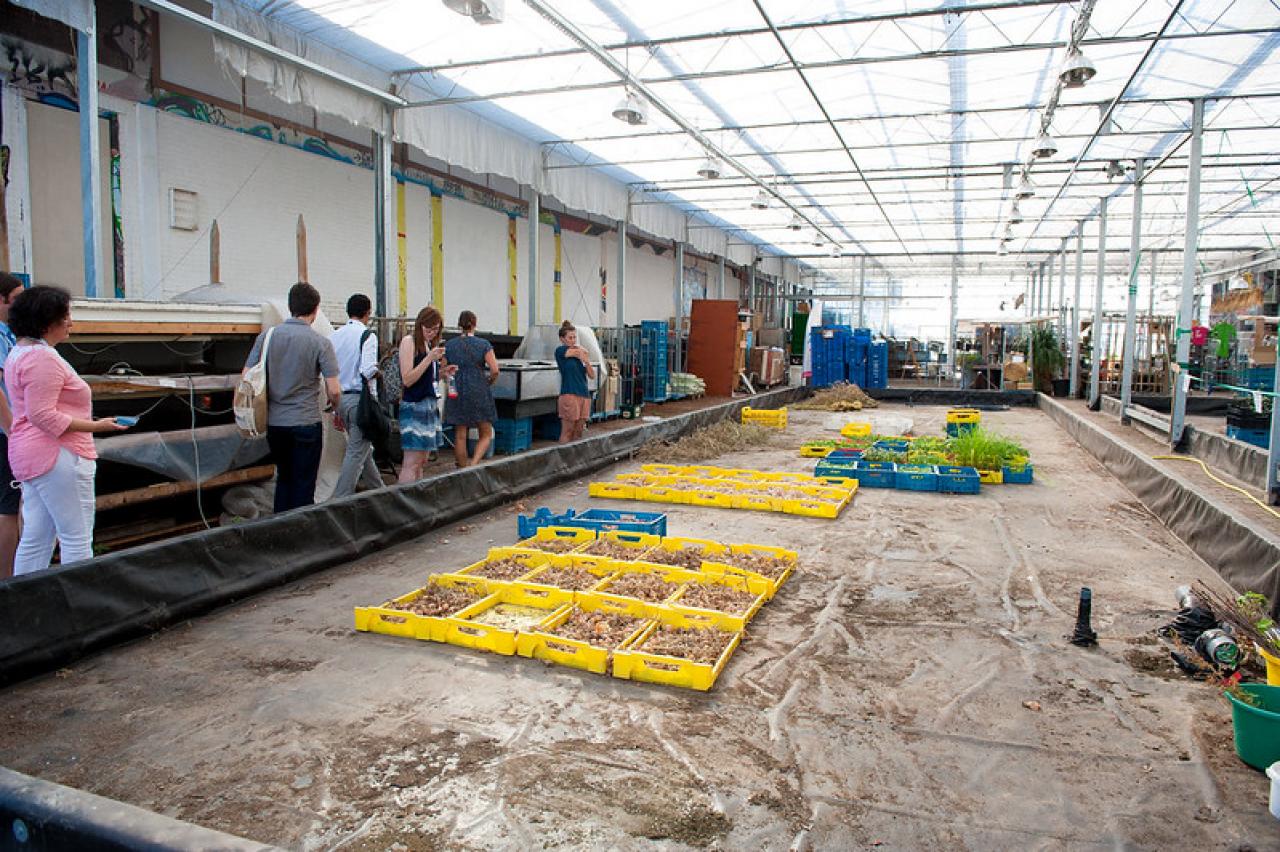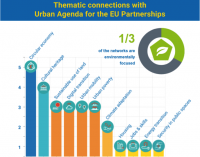
What if we treated the climate crisis with as much urgency as Covid-19?
As many as one third of the new URBACT Action Planning Networks (APNs) focus on climate and the environment. In this article, we reflect on how the challenges and opportunities of their work may look different in a post-Covid world.
URBACT cities more focused than ever on climate change
Environmental sustainability has long been a core aspect of the URBACT approach, comprising one of the three core dimensions of sustainable urban development, along with economic and social aspects. At the same time, climate change has been increasing in prominence on the agenda of city authorities, even if it is sometimes still treated as more of an ‘issue’ than a real ‘crisis’.
May 2020 sees the second-stage approval of 23 new URBACT networks of cities. These include five on the circular economy, two on climate adaptation and one on energy transition. Others are also more indirectly linked, including new networks on healthier cities, mobility, food, the role of business and sustainable tourism. These numbers mark a potential step change for URBACT in identifying and sharing new city-level solutions for addressing climate change.

These networks will now embark upon a two-year process of local stakeholder engagement, transnational exchange and expert support, all leading to the creation of local urban ‘integrated action plans’.
Is Covid-19 a game-changer for addressing climate change?
Already, cities are having to explore new ways of working in the face of Covid-19 and implement rapid responses to the crisis. Could Covid-19 even act as a kind of ‘shock’ to the system that changes our perspectives of what is possible in response to climate change and what we want our cities to look like?
Since the start of lockdown measures, many of us have seen the kind of images of roads, air and waterways that we longed for; just not for the right reasons. “We need transition by design,” stresses URBACT Programme Expert Ania Rok. “But now the system is changing by disaster. Things that were unimaginable for decades have now become reality.”
Amongst the ‘good news stories’ have been dramatic improvements in air quality and the return of wildlife to urban spaces. The reality is not always straightforward; stories of swans and dolphins returning to the canals of Venice were not all they seemed. Nevertheless, the feeling that the public is craving a cleaner, safer world seems very real.
“We have also witnessed an unprecedented wave of solidarity,” highlights Ania Rok. “Greater recognition of the critical importance of high-quality public services… Ideas previously considered too radical – such as the universal basic income - gaining political support… It turns out that our freedom to travel or shop can be restricted in the name of greater good and, at least for the majority of us, they are not what we miss the most.”
What might this mean for cities post-Covid?
Rebuilding our lives and economies after lockdown should represent an opportunity to accelerate sustainability transitions. The environmental movement is calling upon European and national leaders to support a green and just recovery, putting people and the planet first. However, cities can also act at their level and there is lots of good practice to learn from.
Ania Rok believes “that cities that were already investing in healthy environment and quality of life are in some ways more resilient to the crisis... The presence of nature in the city, and especially easy access to green areas, are incredibly important for people’s physical and mental health. Good conditions for walking and cycling are helping people to keep mobile while staying safe.”
Such examples can offer guidance and knowledge to other urban areas on how to chart a more sustainable future, and there is evidence that cities are looking for inspiration. “Most famous is perhaps Amsterdam, announcing they will adopt Kate Raworth’s doughnut model as a framework for green and just recovery,” highlights Ania. “But many others are asking similar questions, especially when it comes to what kind of local economy they want to nurture.”
Many cities are introducing temporary measures to create more space for people and bikes and it will be interesting to see how many of those stay for post-pandemic times. The big unknown is whether the changes in perspective brought about by the Covid-19 crisis will lead to a permanent shift in public attitudes.
Certainly for Ania, “talk of ‘returning to normal’ is anything but comforting, because a world where narrow economic interests triumph over the long-term wellbeing of people and planet should never have been considered normal.”
And what might this mean for URBACT cities more specifically?
URBACT is excellently placed to support cities to exploit any potential opportunities created by the post-Covid reality in order to deliver more sustainable forms of urban development. It can promote existing knowledge and ideas at a time when cities and their inhabitants are, perhaps, more than ever looking for sustainable, community-based solutions.
In this context, the findings and experience of several URBACT Transfer Networks – looking at how to successfully transfer URBACT good practice examples – will never have been more relevant. This will be the case for C-Change on the way that arts and culture can support climate action; BeePathNet on urban beekeeping, TropaVerde on how to encourage environmentally responsible behaviour that empowers citizens to re-use and recycle and BioCanteens support sustainable local food provision.
Equally, the new Action Planning Networks will be able to respond in real time to potential opportunities to increase the ambition of their efforts. There will, for example, perhaps never be a better time to have a network of cities working to explore ways of delivering more sustainable tourism. This network can hopefully deliver ideas for the many urban areas for which the current crisis can be an opportunity to ‘start again’ and do things better.
URBACT is already supporting seven cities on a journey to become Zero Carbon Cities, and a further nine to become net zero energy cities through an Urb-En Pact.

The work of networks promoting enhanced approaches to the circular economy can also be important contributors to local climate responses, including URGE, which focuses on reducing waste in the building sector and Resourceful Cities which is exchanging on ways and means of developing the next generation of urban resource centres to serve as catalysts of the local circular economy.
Hopefully, the impact of Covid-19 can help to increase the ambition of these networks and their cities to promote the kind of behaviour change needed to actually start to address climate change effectively. We will certainly be following and communicating their work with interest.
Final thoughts
Climate change has been a political issue for so long, but action seems to have progressed at a snail’s pace – a dangerous state of affairs that efforts such as the school pupil-led climate strikes have tried to address. The European Parliament finally declared a ‘climate emergency’ in 2019 and the European Commission’s Green Deal sets a target of carbon neutrality by 2050. By comparison, Covid-19 has arrived suddenly and led to dramatic political and social responses.
Clear opportunities exist at European level to frame the post-Covid environment to ensure that more adequate responses to the climate emergency are put in motion. The revision of the Leipzig Charter principles of sustainable and integrated urban development is a prime opportunity to send a clear message to national and local policymakers on the priorities for an integrated approach for cities.
As the preparations for the next generation URBACT programme (2021-2027) get underway, cities have already indicated that climate mitigation and adaptation are top priorities that cities want to tackle. We are already starting to tackle issues around how to operationalise the principles of the Green Deal and climate proofing. Carbon-offsetting actions were already introduced as eligible costs for transnational projects in 2019.
URBACT will continue to work actively to support cities to exchange and learn from each other about all of these issues. We encourage our participating cities to be as ambitious as possible and we look forward to communicating about their successes, practices and new ideas. In a tale of two crises, it is about time we treated the climate crisis with as much urgency as Covid-19.
-
Check out all the recently approved Action Planning Networks!

